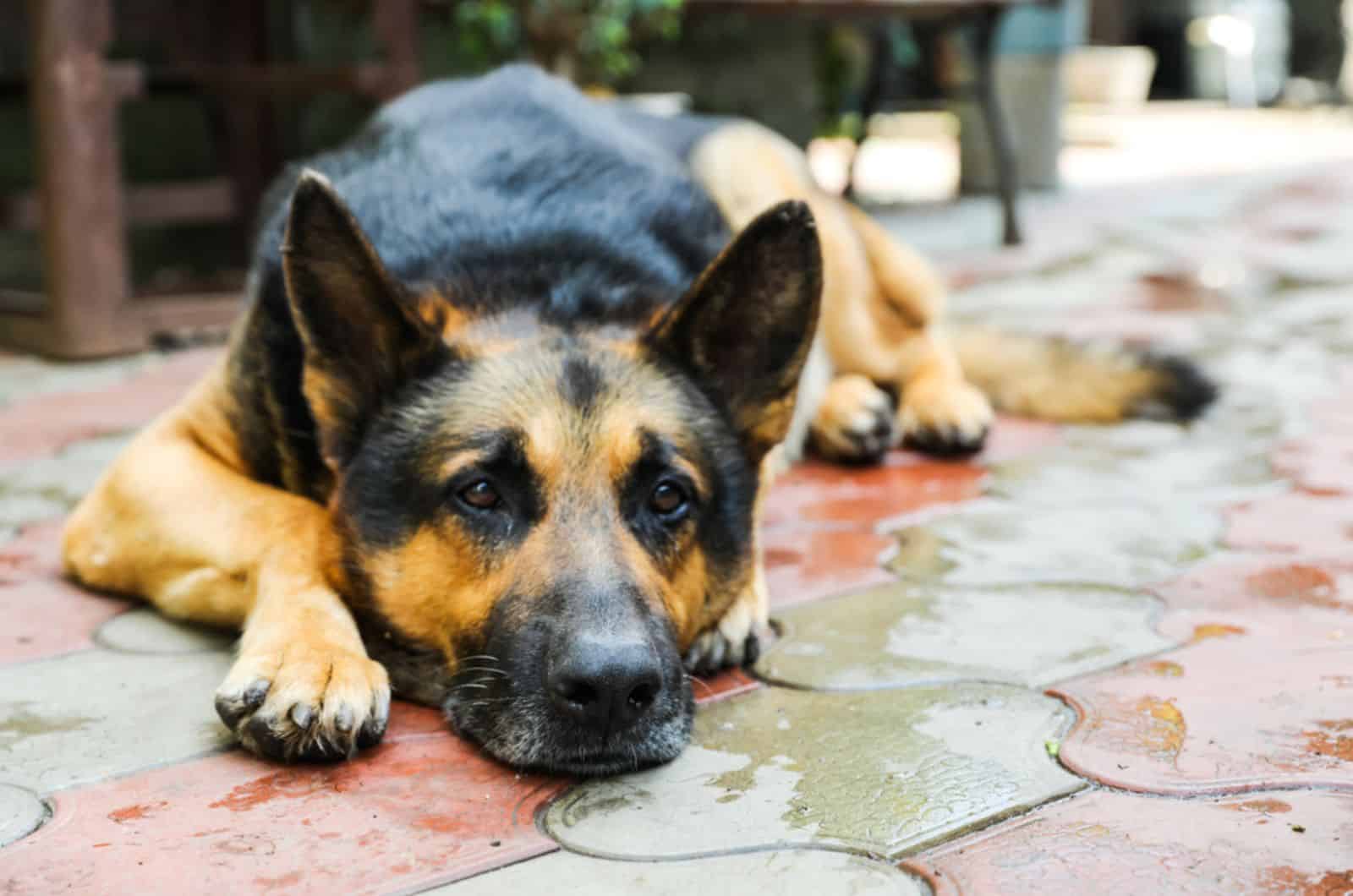German Shepherds (GSDs) fascinate us with their amazing temperament, intelligence, courage and tenderness. However, these dogs might sometimes also be anxious. Why does this happen? Why is my German Shepherd so anxious?
There are many reasons for anxious behavior in dogs. The essential thing here is to understand why anxiety appears in your German Shepherd. Only then will you be able to help your pooch.
Once you notice certain symptoms of anxiety in your GSD, you should not panic right away. When you understand why some behavior appears in our canine friends, you will be competent to undertake steps to make your dog himself again.
This is why you should read this article and learn all the common causes of German Shepherd’s anxiety, and ways to help your anxious dog.
Why Is My German Shepherd So Anxious?
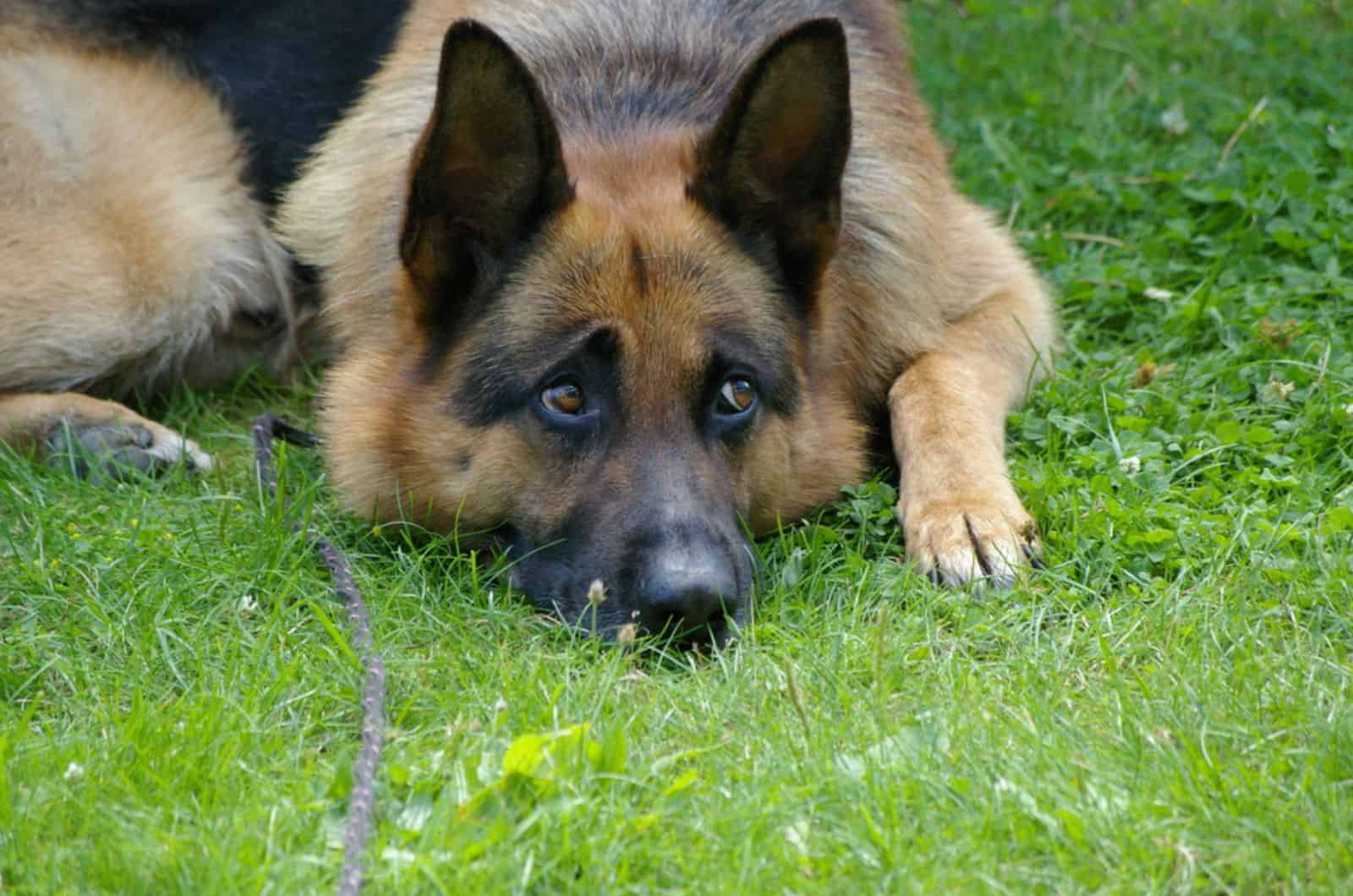
Anxiety is not something we relate to a certain dog breed – all dogs can become anxious at a certain point in their life.
We all see German Shepherd dogs as powerful and even intimidating canines, but this does not mean that these mighty dogs cannot become anxious. Because, they can. And it can become really bad if you don’t help them on time.
All dog owners who have seen a dog that is afraid of everything are well aware how difficult this can be. In some cases, this can even seriously impair the quality of life of both the owner and the dog.
Frightened dogs are often anxious dogs for some reason, so it’s important to understand what types of dog anxiety there are to recognize what kind of situation your German Shepherd is dealing with.
1. Separation Anxiety
The most common reason for anxiety in German Shepherds is separation anxiety.
Anyone who has a German Shepherd, or has at least spent some time in this dog’s company knows how affectionate and loyal the GSD is to its owners. This dog is a big guard dog and its main task is to protect its owners.
When you first brought your new puppy into your home, you probably spent all your time with him. Your dog has become accustomed to your constant presence and enjoys your company.
But, of course, we all have to leave our homes for work, commitments, or any other reason. Some dogs experience anxiety at these moments. They don’t understand where their owners are going? When will they come back? Did they leave them to be alone forever?
Sad doggy face waiting at your front door is one of the clear symptoms of separation anxiety in your GSD.
Although you always return home, you see clearly that your German Shepherd is under stress. Simply, the dog wants you to be with him all day and your absence causes anxiety in him.
2. Social Anxiety
Your German Shepherd behaves perfectly normally when you are alone at home, but suddenly becomes frightened and anxious when you go to the dog park or when you are in the company of new people. This could be a sign that your dog has social anxiety.
Many dogs develop this type of anxiety due to insufficient contact with other people and animals outside their home. So, poor socialization often causes a dog to become afraid of social contacts.
A socially anxious dog hides behind its owner and avoids any contact with strangers. Anxiety in these cases can make it significantly harder for you to interact with other dog owners in places like parks and during walks.
3. Anxiety Caused By Noise
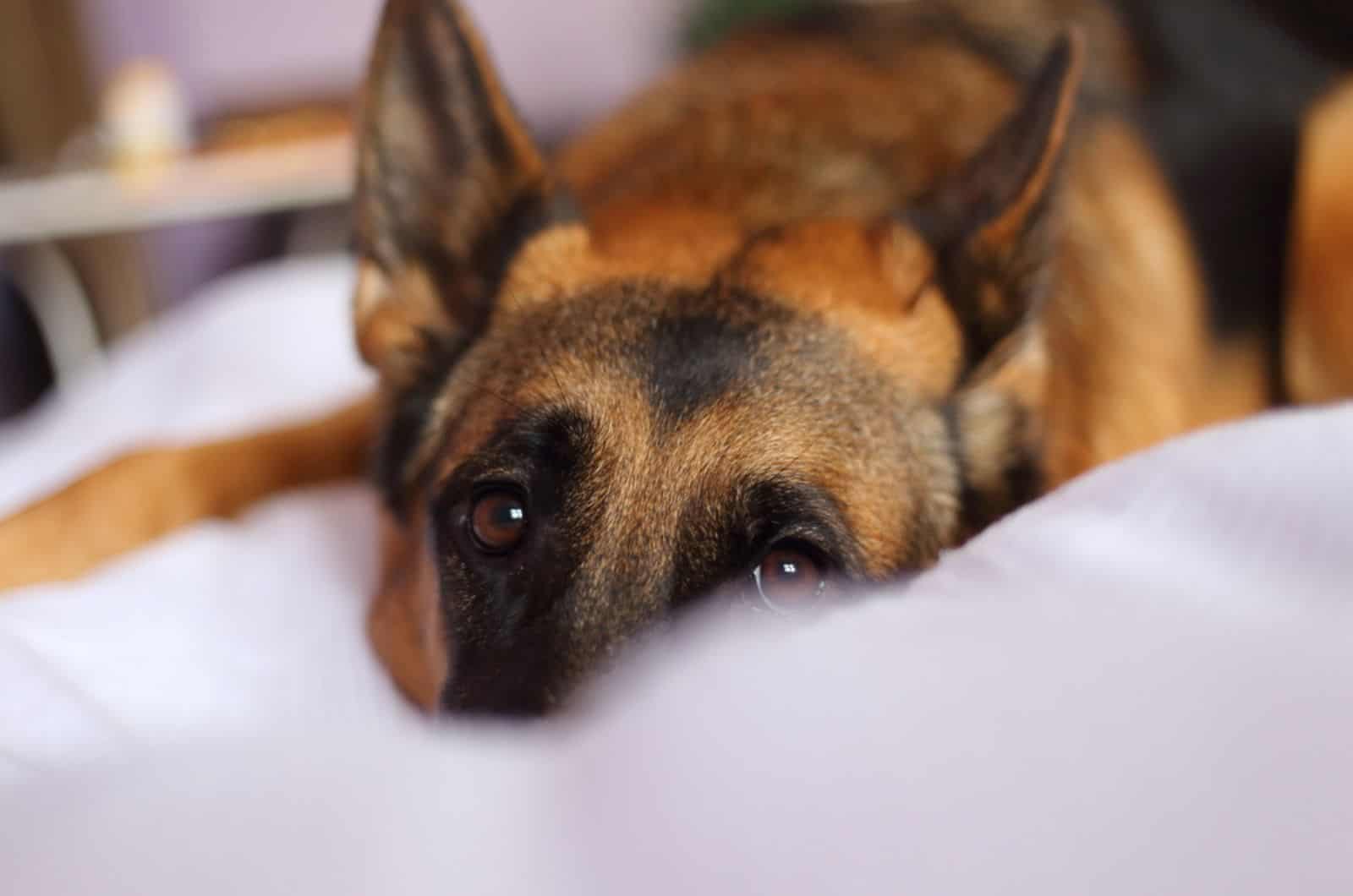
Have you ever noticed your German Shepherd suddenly got scared of something inside your house? This might be some loud noise that frightened your dog.
Many dogs are afraid of loud noises, such as the sound of a vacuum cleaner or a dishwasher. Outside sounds that most often cause anxiety in dogs are firecrackers, fireworks, and thunderstorms.
Your German Shepherd may react anxiously to loud noises for several reasons. Maybe his hearing is sensitive, so sounds like this can be so loud that they even cause him pain.
Maybe his hearing is not the best, so when he suddenly hears a loud sound, it causes anxiety in him.
Most dogs will react to some loud sounds from their surroundings, but if your German Shepherd has a clear aversion to loud noises, it would be best to consult a veterinarian.
4. Anxiety In Older Dogs
As with humans, everything changes in dogs as they age. Many dogs become less mobile, their senses will not be as sharp as they used to be, and they show less desire to play and socialize.
Some dogs can also suffer from Canine Cognitive Dysfunction, which is similar to Alzheimer’s disease in humans.
All of these can cause anxiety in your older German Shepherd. These working dogs are normally very active and energetic, and it is difficult for them to understand what happens to them as they age.
Anxiety is quite common in older dogs, regardless of the breed.
5. Pain
Any kind of pain can also affect the appearance of anxiety in your German Shepherd. So, maybe your dog injured himself while playing or running, and now this is bothering him.
And maybe your GSD is in pain due to some underlying health issue that you are not aware of.
Dogs are afraid of the unknown, and any change can cause anxiety in them. When something suddenly starts to hurt our dogs, they can’t tell us with words, but we can learn a lot from their body positions and their general behavior.
Here it is important to know that regular veterinary check-ups are essential to take care of your pet’s health.
What Are Some Signs Of An Anxious Dog?
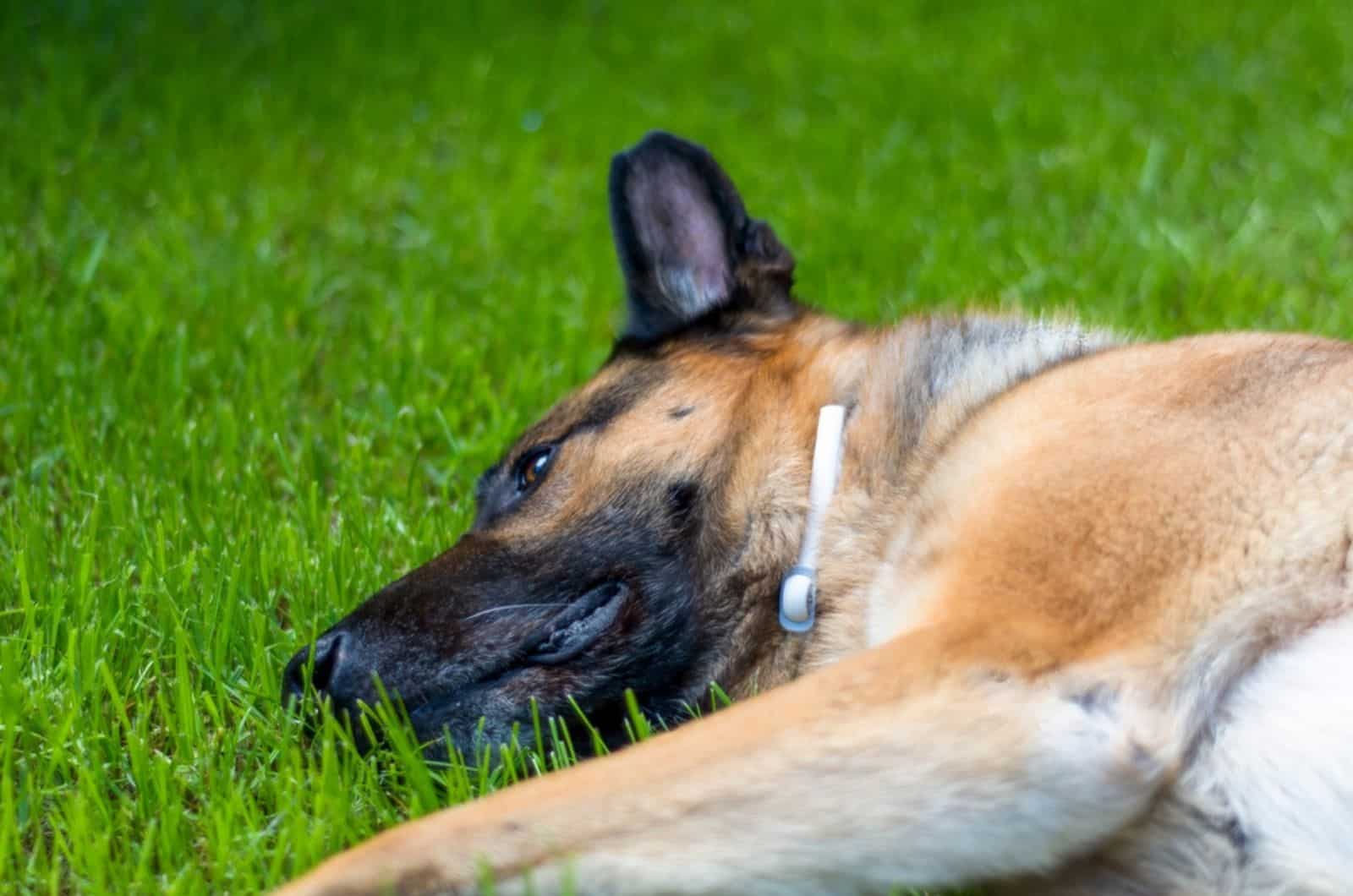
You have noticed some changes in your German Shepherd, but you are not totally sure whether these are signs of dog’s anxiety, or some other health problems.
This is why it is essential to know how to recognize signs of an anxious dog. Let’s learn more about each of them.
Destructive Behavior
Many anxious dogs will show destructive behavior, such as chewing, digging, or even aggression.
We cannot say that German Shepherds are aggressive by default, but, if this dog feels threatened, he might become aggressive.
So, sudden aggressive behavior might be a sign of your German Shepherd’s separation anxiety, or social anxiety.
Even if your dog is properly trained and socialized from a young age, anxiety can still cause behavior problems in him.
Dog Pees A Lot
If your dog is urinating frequently – much more often than he usually does – this could also be a sign of anxiety.
A dog that is anxious about a certain situation might show this by suddenly having to urinate frequently. Even if your German Shepherd has been potty trained for a long time, he could suddenly start having accidents all over the house.
This is a clear sign that something is really scaring your dog and that it’s time to find the source of his anxiety.
Dog Shakes A Lot
Your German Shepherd suddenly shakes a lot, but it is not that cold outside? And he is not just excited because you are about to take a walk together? Your GSD might be shaking due to anxiety.
Pay attention whether your dog starts shaking in specific situations, like, during a thunderstorm, or when seeing a certain person.
When you discover what triggers shaking in your dog, you will be able to prevent your German Shepherd’s stress and anxiety.
Dog Barks A Lot
Okay, the German Shepherd is not exactly the most quiet dog out there; actually, having a GSD means tolerating a lot of barking. After all, this is a guard dog that warns you about potential danger with his barking.
So, a German Shepherds barks a lot, but, you suddenly notice your GSD started barking even more often, and now is barking at you, your family members, and almost everything in his surroundings.
Excessive barking might also be a sign of a dog’s anxiety. Barking is a way for dogs to show all kinds of emotions – their happiness, excitement, alertness, but also fear and anxiety.
Dog Drools A Lot
Dog drooling is a normal occurrence, and it is more common in some dog breeds rather than in others.
You have probably seen your German Shepherd drooling, especially when you are just about to give him his favorite dog food.
But, there are also other causes of dog drooling, like dental problems. Furthermore, a dog might drool excessively due to anxiety.
If you notice some other symptoms together with dog drooling, such as lethargy, lack of appetite, or dog using inappropriate places for defecating or urinating – these are all signs of dog’s anxiety.
What Can I Do To Help My Dog With Anxiety?
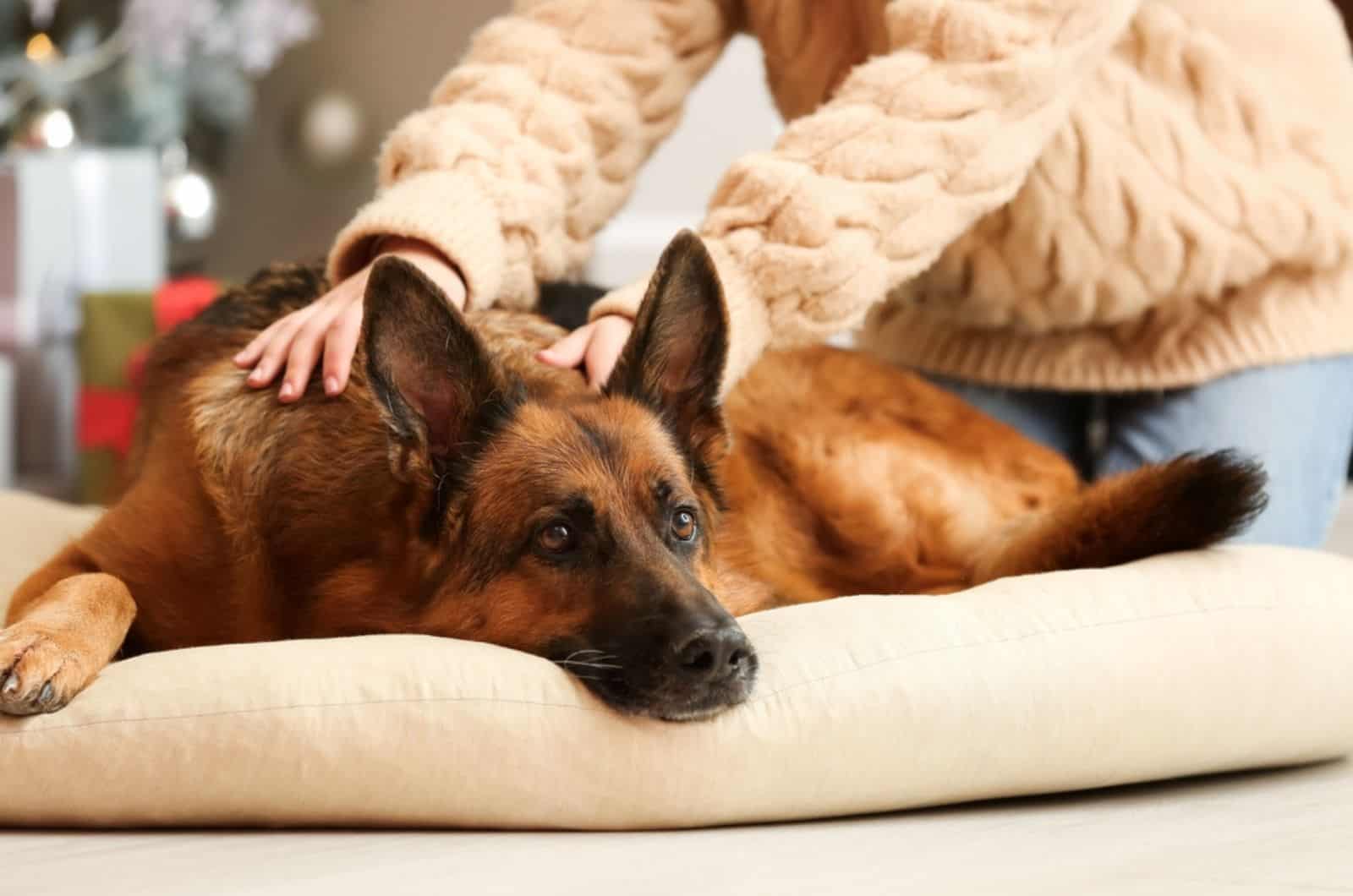
If your German Shepherd deals with anxiety, you should take this very seriously. As we have seen, there are different forms of anxiety in dogs, and, in some dogs, this might even require the assistance of a dog behaviorist or a dog trainer.
Still, there are some things you can do to help your German Shepherd. Our dogs’ well-being should be our number one priority, so, let’s see what you can do to help your anxious dog.
1. Establish Your Routine
As soon as you establish a puppy schedule, your German Shepherd will get used to certain daily routines. When your puppy just arrives at your home from a kennel, it will take some time for him to get used to the new surroundings.
All dogs like to know what to expect from a day, so, as soon as your puppy starts to show some kind of affection towards you, you should start creating your daily routine.
This should include regular meals at the same time in a day, regular potty breaks, daily exercise, and training time.
When your German Shepherd gets used to a certain schedule, he is less likely to develop anxiety. Having a regular routine is equally important for the dog’s mental health as it is for human’s.
2. Dog Training
German Shepherd training is one of the best techniques to help an anxious dog. When you give your dog some tasks every day and teach him piece by piece, the dog will be busy and will not have time to think about sources of stress.
Also, it is equally important that your German Shepherd is stimulated both mentally and physically. So, you can teach your dog new commands and tricks while you are walking or hiking.
Remember to use positive reinforcement when training your German Shepherd, as these dogs will respond very well to this type of training. Always have fresh dog food or your dog’s favorite toy ready to reward him for obedience.
All this together will have a positive effect on your German Shepherd, and will reduce his level of anxiety and stress.
What is also important is the amount of time you spend with your dog – don’t forget that your company through training and exercise is a form of therapy for your anxious dog.
3. Entertain Your GSD While You Are Away
If you are living alone, and you cannot ask somebody to care for your dog while you are not home, there are still some tips you can use to entertain your GSD while you are at work.
You should always leave your dog with enough toys to keep him busy while you are away. This can be some chewing toys, or some interactive toys which can keep him entertained for hours.
You can also leave a part of your clothing in your dog’s crate – this way, your German Shepherd will have something with your smell on that will comfort him while you are away.
No dog should be left alone for too long, but, still, we all need to go out at least for a couple of hours every day. If you keep your dog busy while you are not at home, he is less likely to develop anxiety.
4. Music For Dogs
If your German Shepherd suffers from separation anxiety, something that could certainly help him is music on the TV or radio.
Quiet and relaxing music can relax your furry pet and relieve it of stress.
Also, if you leave the music on while you are away from home, the dog will be less able to hear sounds from outside that might stress and distract him.
5. Medications
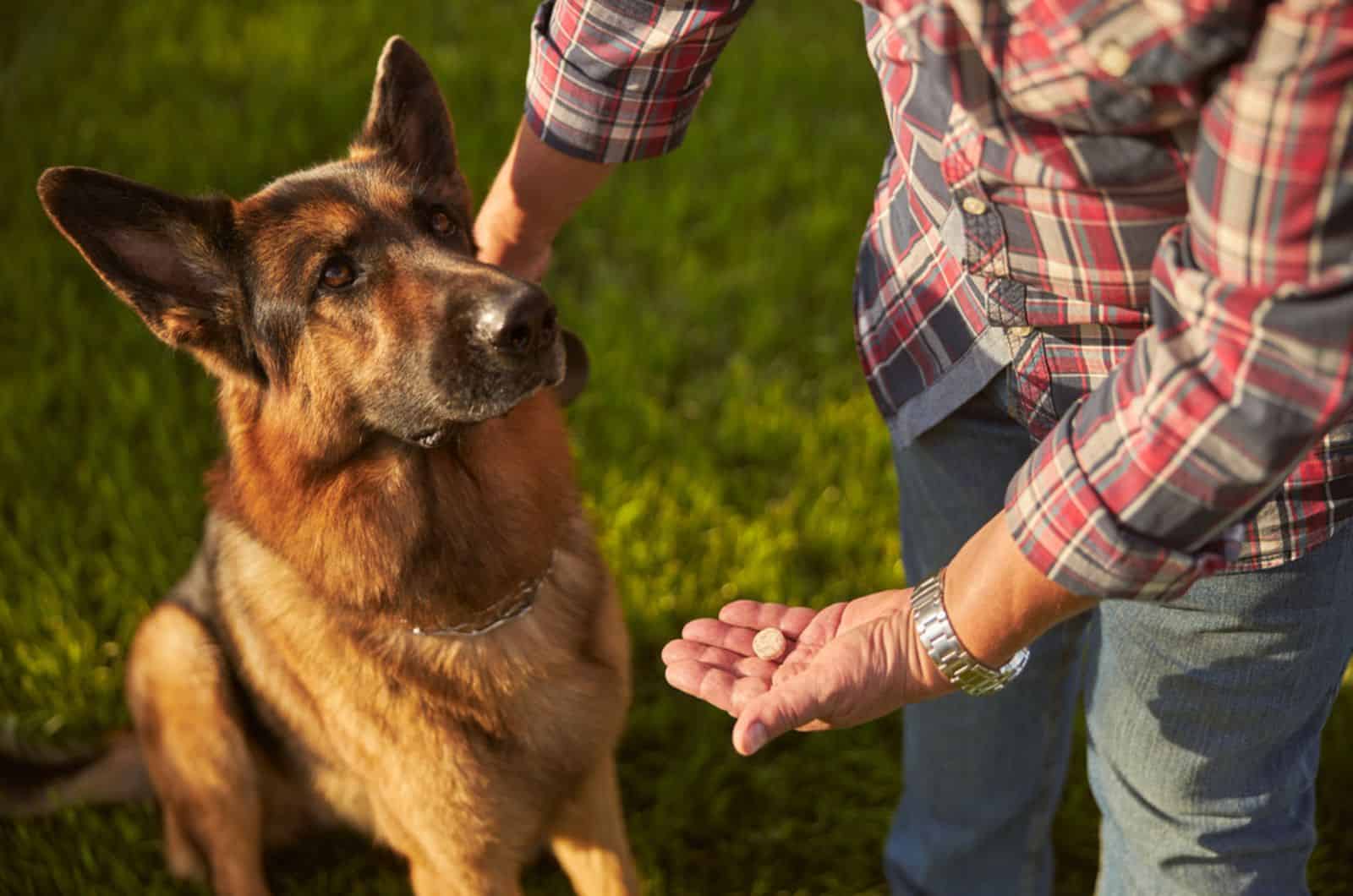
Today we have various medications available that can help our dogs with anxiety.
Of course, it is definitely recommended that you try to help your German Shepherd in all other ways possible before you decide to give him pills.
Also, you should definitely not decide on your own whether your dog should take tranquilizers. First of all, it is necessary to consult with a veterinarian and find the ideal solution.
6. CBD Oil
The CBD is a compound found in hemp and cannabis. Hemp contains the compound THC, which gives it psychoactive properties, and which is illegal in many states. On the other hand, CBD is legal as a medicine for many diseases and conditions, both in humans and animals.
Currently, many scientists are studying the impact of CBD oil on dogs, and so far it is clear that this oil has a healing effect on certain health problems in dogs.
In addition to helping dogs with allergies and other autoimmune diseases, this oil can significantly help dogs suffering from anxiety.
It doesn’t matter if it’s separation anxiety or anxiety due to firecrackers or thunder – CBD oil is very good for relaxing and calming dogs.
When it comes to dosing CBD oil for your German Shepherd, it is important to follow the manufacturer’s instructions, as well as to start with a smaller dose in the beginning and see how your dog reacts.
7. Pheromone Diffuser
We all know how important smells are to our dogs – their sense of smell is the most important way dogs actually understand the world around them.
For this reason, a pheromone diffuser for dogs is a great way to reduce anxiety in your pet.
These diffusers mimic the soothing pheromones that a mother dog emits when nursing her newborn puppies. A pheromone diffuser can be very useful for soothing and calming the dog in situations that cause anxiety in him.
8. Counterconditioning
One way you can help your anxious German Shepherd is counter conditioning.
This technique is about changing the perception of the stimulus that causes anxiety and restlessness in your dog.
For example, if you have noticed that your German Shepherd starts shaking and barking loudly every time during a thunderstorm, you know the cause of his anxiety.
What you can try to do next time during a loud thunderstorm is to throw your dog his favorite toy. In this way, you will attract the dog’s attention, and you will take his mind off the thunder, and the dog will focus on his favorite activity – playing with you.
Once the dog accepts your idea, praise him for good behavior and reward him with a favorite treat. This is a good way to calm your scared dog and make him feel safe even during thunderstorms that cause him fear and anxiety.
9. Give Your Dog Company
Since separation anxiety is the most common form of anxiety in dogs, giving your GSD animal company might significantly reduce the possibility of your dog becoming anxious.
So, you could think of adding another dog in your family. It can be another German Shepherd, or some other, equally great, dog breed. It can even be a cat!
Cats and dogs have a specific relationship, and we cannot say for sure that a German Shepherd will get along with a cat, especially at the beginning.
However, dog socialization is crucial here, as in any other aspect of a dog’s life. When a cat and a GSD are properly introduced, and once they get used to each other – they might even become great friends!
Don’t forget how intelligent and eager to please the German Shepherd is; with the right training methods, there is nothing this dog won’t be successful at.
Conclusion
Hopefully, reading this article gave you an answer to the question: Why is my German Shepherd so anxious?
All dogs might become anxious at a certain point of their lives, but this does not happen without a good reason.
Some dogs become anxious due to separation from their owners, some are afraid of loud noises, and some are injured or sick, and this creates fear and restlessness in them.
Dog anxiety can develop into a deeper problem, and all dog owners should be aware that in some cases it will be necessary to seek the help of a veterinarian or a dog trainer.
However, there are still steps we can take to ease anxiety in our furry friends. We can spend enough time with them, introduce them to a daily routine, learn with them through training, give them enough toys, and maybe get them company.
What you need to know is that your dog can become anxious, regardless of how devoted you are to him and how much time you spend with him.
However, nothing is irreparable, so your German Shepherd, with proper care, can soon become that same old, happy, unburdened dog!
